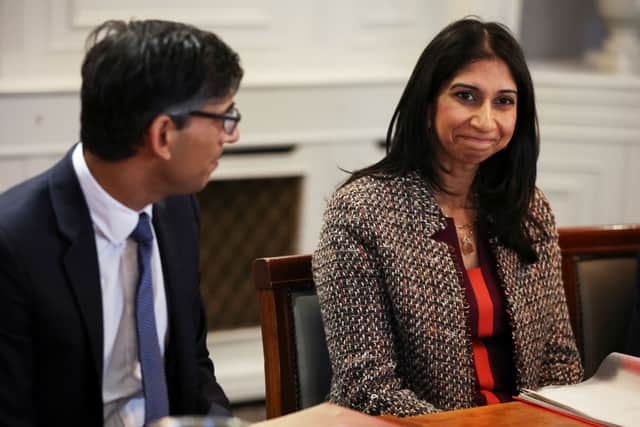Immigration: British public hugely overestimates how many asylum seekers come to UK, Red Cross study reveals
and live on Freeview channel 276
People in the UK drastically overestimate the number of asylum seekers coming to the country, a new study has revealed.
Polling by the British Red Cross found that 59% of people believe refugees make up a much higher proportion of migrants than they do in reality, with almost one in ten Britons believing they represent 75% of people migrating to the UK. According to figures from the Home Office, asylum seekers make up just 7% of overall migration.
Advertisement
Hide AdAdvertisement
Hide AdThe survey of 2,000 UK adults also found that the majority of the public (63%) believe that "most" people seeking asylum travel further than neighbouring countries, while nearly a third (30%) believe "most" attempt to make it to the UK.
This is an argument many critics use in an attempt to prove people arriving in small boats are not 'real' refugees, but data from the United Nations High Commissioner For Refugees (UNHCR) shows that this is a misconception - as 70% of the world's asylum seekers remain in countries next to their country of origin.
Despite these misunderstandings though, Red Cross' research also shows that the majority of Brits (87%) still believe the UK should offer refuge to people fleeing war, conflict, and persecution. Meanwhile, nearly half (43%) of people say the UK should take "at least our fair share".


To coincide with the release of this polling, the British Red Cross has also published a new, interactive tool which aims to help people better understand the reality of the asylum system and "debunk" common myths and misconceptions.
Advertisement
Hide AdAdvertisement
Hide AdThis includes a breakdown of the 1.16 million people who migrated to the UK in 2022 - which shows that just 76,000 (6.5%) of them were asylum seekers, and just 6,000 (0.05%) arrived via resettlement. In contrast, 915,000 (78%) arrived via 'other' immigration, which includes things like work, education, or visitor visas.
There is also data on asylum seeker claims categorised by nationality, with the most claims in the six months leading up to June 2023 coming from Afghanistan, followed by Iran.
Afghanistan was taken over by the Taliban in August 2021, leading to a huge crackdown on women's rights, while Iran has seen unrest since the death of 22-year-old Mahsa Amini in September 2022, with hundreds of protesters killed, subjected to enforced disappearance, and imprisoned in dangerous and brutal conditions.


The British Red Cross' report also shows that asylum casework productivity at the Home Office has dropped by 70% since 2015/2016, despite a 307% increase in staff, and that there have been an unprecedented number of withdrawals from the asylum system over the past year.
Advertisement
Hide AdAdvertisement
Hide AdHowever, there is no data on why those cases have been withdrawn, with the charity warning that some refugees are unaware they have been removed from the system, while others have had claims rejected due to issues with administration.
Commenting on the research, Mike Adamson, British Red Cross chief executive, said: “As the largest provider of refugee services in the UK, we see the kindness and support people have for refugees and people seeking asylum every day.
“Our polling reaffirms this, showing that most of us believe the UK should offer safety to people who are fleeing conflict or persecution. Despite this support, conversations around refugees and asylum issues can be polarising and often include misconceptions.
“That is why we’re launching a new data tool, to help separate fact from fiction. We hope this will empower people and bring a renewed focus on practical solutions that support local communities and the men, women, and children in our asylum system.”
Advertisement
Hide AdAdvertisement
Hide AdHe added that the charity hopes it will be able to “work with the government to help tackle the backlog, create more safe routes, and form a more effective system that allows people to live in dignity with the support they need.”
Migration has been a major talking point for the current Conservative Party government, with Prime Minister Rishi Sunak making one of his key pledges "stop the boats", in a reference to Channel crossings.
There has also been a lot of controversy over the government's recently-passed Illegal Migration Act, which will see anyone deemed to have arrived in the UK via ‘illegal’ or ‘irregular’ routes barred from claiming asylum - before being detained and then deported to their country of origin or a third country such as Rwanda.
Red Cross previously told NationalWorld about its opposition to the legislation, warning that "deterrence policies do not work" and that other solutions - such as creating more streamlined application processes to cut the backlog - are "far more effective" ways to tackle the current asylum crisis.
Comment Guidelines
National World encourages reader discussion on our stories. User feedback, insights and back-and-forth exchanges add a rich layer of context to reporting. Please review our Community Guidelines before commenting.
